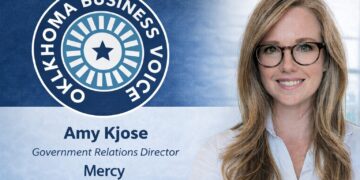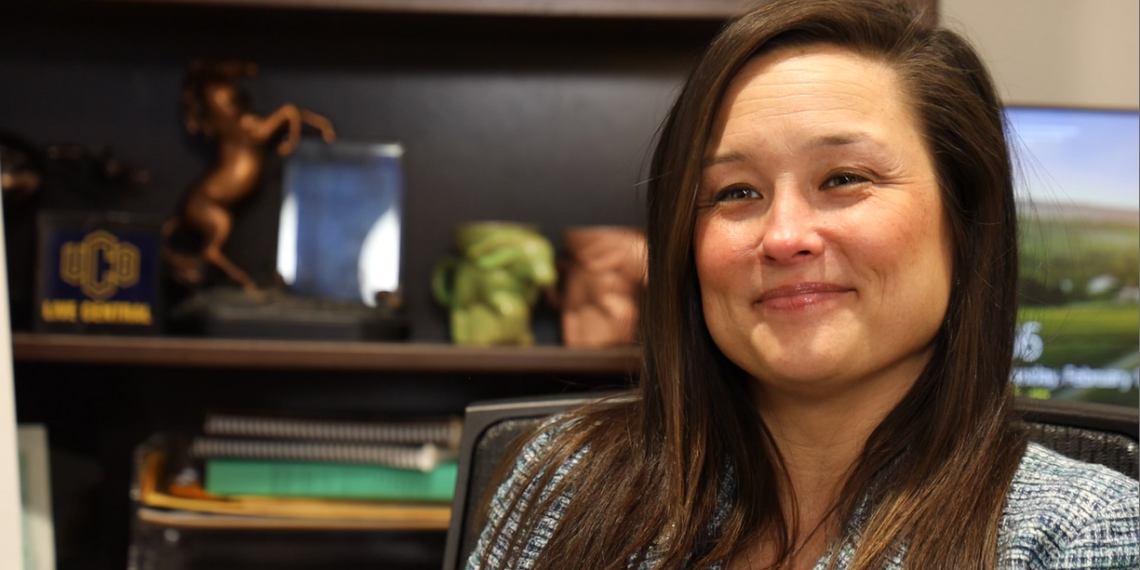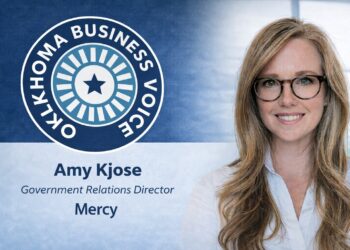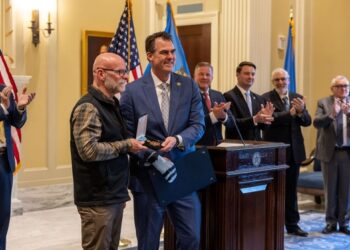OKLAHOMA CITY (OBV) – Oklahoma House Democratic Leader Cyndi Munson says helping all Oklahomans have a better quality of life is the key to the state achieving greater success.
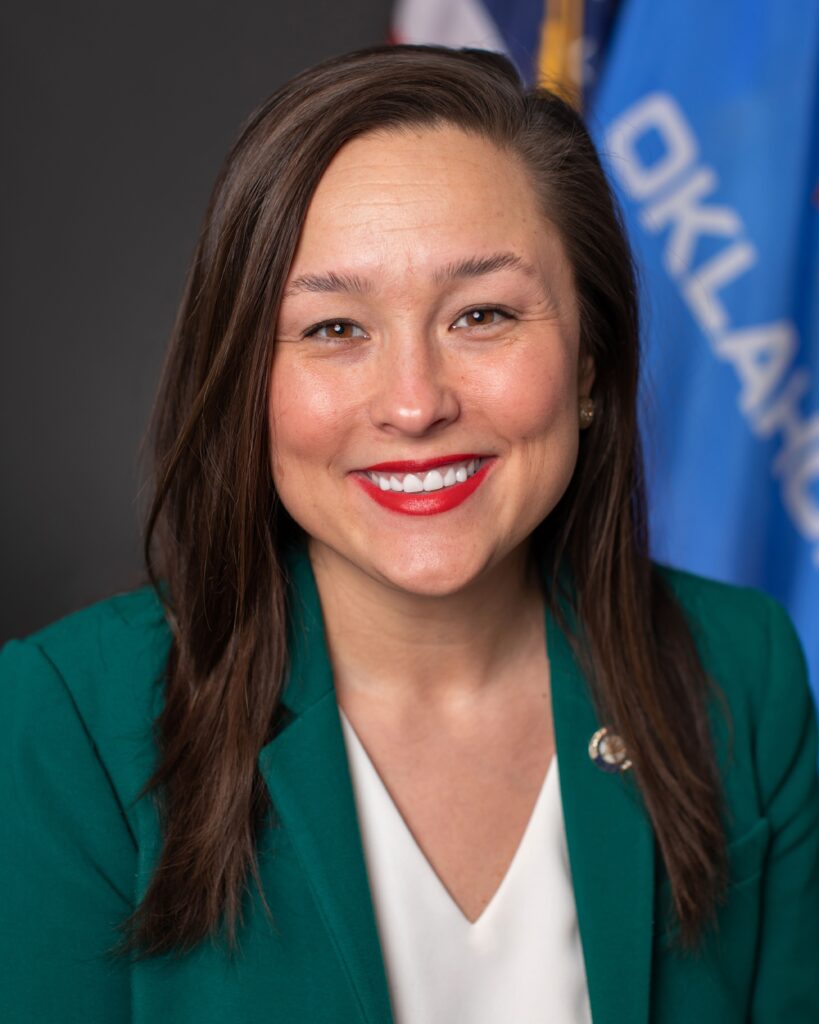
Munson, D–Oklahoma City, was elected to the Oklahoma House of Representatives in 2015, becoming the first Asian-American woman elected to the Oklahoma Legislature. Her Democratic colleagues elected her House Democratic Caucus Chair in December 2018.
She is a member of several legislative committees – Appropriations and Budget, A&B Public Safety, General Government, Government Oversight, Health and Human Services Oversight and Joint Committee on Appropriations and Budget – and is passionate about criminal justice reform and education.
She sat down with Oklahoma Business Voice for a one-on-one interview about her top priorities for the 2025 legislative session and a wide range of important concerns, including sales tax credit relief, workforce development, education, childcare, criminal justice reform, tax cuts and bipartisanship.
What are your top priorities for this legislative session?
Munson: This legislative session, I’m really focused on what I heard when I was out knocking on doors and talking to folks in my district, and really across the state. I heard a lot about financial challenges and just making sure that you can make ends meet. That’s been the number one topic of conversation and what we saw in the national election, too.
I think there were a lot of concerns around the economy. And so, talking to my constituents, I was asked what are some state solutions? What are some things that our state lawmakers can do to address those challenges? And so, I have filed a series of bills, most of them tax credits, but also looking at increasing the minimum wage here in Oklahoma.
There’s a lot of talk about tax cuts specifically coming from the governor and some Republican legislative leaders. But I came into the legislature when we were facing some really difficult financial times and didn’t have enough money to invest in our core services through state government. I think there is a way that we can protect our revenue base while also giving some financial relief.
So, I have filed House Bill 2228, which is to modernize and expand the sales tax credit relief program that we already have on the books. It was established in 1990 and gives folks $40 back to those in a particular income range. And I’m increasing that to $200 and then expanding the number of Oklahomans that can access the credit. So, if you make less than $75,000 and have children or a disability, and then depending on your age, you can get more of that tax credit. And I think that’s a way that we can provide real relief for people while also not decimating our revenue base. That is so critical to ensuring that services are executed for our constituents across the state.
In what ways do you think that the sales tax credit will make a difference for Oklahomans? How will it help them make ends meet easier?
Munson: I think more than anything, it will help them pay for things that are just basic necessity items, like groceries, putting gas in your car. If rent has gone up, then that helps pay rent or even when emergencies happen. I always talk about tires – because I have my own experience with tires – I feel like I buy tires every other month. A lot of that is due to our roads. When those types of situations come up for a lot of Oklahomans, that can totally put someone out of financial stability, and they face a crisis because they have to pay for something that they weren’t planning for.
So, being able to get some money back to be able to take care of those needs, I think, will be really helpful. At the end of the day, for real change in terms of how we improve people’s lives when we’re thinking about finances, we need to bring jobs to Oklahoma that pay higher wages. We need to look at increasing the minimum wage so people can make a living wage where they’re not working multiple jobs to make ends meet, when they could be with their families or contributing more to their community and engaging in their community and not just so bogged down by financial stressors.
Are there any legislative initiatives from last year that didn’t quite make it to the finish line that you hope will be revisited?
Munson: I have refiled my legislation to address wrongful conviction compensation. Right now, in Oklahoma, if you’re wrongfully convicted, the cap in terms of financial compensation that you can get back is capped at $175,000. It’s in our Tort Claims Act, in that area of law.
I have met with a constituent, a close friend of mine who I had no idea her father was incarcerated when she was in high school. She talked to me about the challenges that her dad experienced after being wrongfully convicted and then being back in the community, raising his kids and his family, not being able to get a job, making it really difficult to just take care of himself because he can’t get the jobs that he needs to take care of himself and her mom.
I started looking at other states and working with the Innocence Project and some other organizations that have worked with those who are wrongfully convicted, trying to get them back into their communities. Whether you’re deemed innocent or not, unfortunately, that stigma stays with you. I want to readjust our compensation and make it to where an individual can get access to compensation at the same amount as the median income of Oklahomans, which is about $50,000. And they would get that in perpetuity for the number of years that they were incarcerated. And they would also have access to health care benefits and education benefits, whether that’s for themselves or their descendants.
When I looked at states around us – Texas, Kansas, Missouri – there are similar compensation packages that someone who is wrongfully convicted would be eligible for. So, I felt like because of our state’s being similar politically and demographically that it might be something that would easily move that through the process. And I have had [legislators] on the other side of the aisle who think it’s a good policy and have worked with me, especially in the last year or so. Individuals who have been wrongfully convicted and it being publicized in the media has brought more attention to the issue.
How important is growing Oklahoma’s workforce to you?
Munson: It’s important in that I know that in order for our state to thrive and to succeed, we have to have workforce opportunities that provide Oklahomans a living wage, where jobs are safe and actually provide for individuals and their families, but also for our communities in meeting the economic needs of our communities. But that means that we have to invest in public education. We have to take care of our schools K–12, but also higher education and CareerTech and apprentice programs and practice programs that are so important. And looking at how are we taking care of people in our state so they can engage in the workforce.
I know that any company that’s looking at the state of Oklahoma is going to ask, “What is the status of your schools? What is the health care of your residents? And are they skilled and trained? And if not, can they be?” And then also thinking about how can we grow our own workforce. We’re always looking at and talking about businesses coming to Oklahoma versus what are the things that Oklahomans can do right now. There’s an entrepreneurial spirit here in Oklahoma. And what can we do to encourage that and keep Oklahomans right here in our state instead of going elsewhere to find those opportunities?
What are some workforce reform and growth initiatives that you want to see this year? And what do you think are some incentives or initiatives that could help keep those Oklahomans?
Munson: Number one is investing in education. Education transforms a person’s life, especially someone who in their own life right now may not have a ton of opportunities, but they can seek those opportunities through education. I think about myself. I’m the first person in my family to graduate from college, and if it weren’t for that, I don’t believe I would be sitting in the position that I am today.
I’m always looking at how are we taking care of our young people and those who are in post-secondary education. I am very passionate about the Oklahoma’s Promise program. I’m a recipient of that program. And it has definitely changed my life. And so finding ways that we can expand it and allow more Oklahomans to access the program [is important to me]. Last year, we passed legislation to include students with disabilities. Over the last several years, I have filed legislation to allow students who have been involved in the juvenile justice system to be able to apply for the program if they meet the academic and income requirements.
These students in particular, who I’ve had the opportunity to work with in my work through the nonprofit sector before I came to the legislature, they need the that kind of hope. They need those opportunities to get out of the situation that they’re in. And I highlight all of that because I feel like we don’t always look at our full potential when it comes to growing our workforce. There’s so many people that are either marginalized or sort of left behind because of some of our policies.
We are constantly thinking about who can we bring to the state versus who is already in our state. And then, what programs do we have on the books that we can invest in more or modernize to make sure that Oklahomans have more access to it?
What can the legislature do to help lower income and struggling Oklahomans obtain good, steady jobs that can lead to a promising career?
Munson: When we’re thinking about workforce, we have a holistic approach. So, for me, it’s education and then health care. Our health care statistics are not great. And more investment in health care through the legislature – making sure that what regardless of where you live in Oklahoma, you have access to health care or a hospital for preventative care and things like that – is really important.
Stable housing, that’s a big issue in our state. And when you’re thinking about somebody who needs to go to work, who is healthy and capable to focus on work, these are some basic things that need to be addressed in order for them to be the most productive that they can be in the workforce.
I think there’s so much more work we can do around taking care of an individual person. And that’s going to strengthen our workforce, making sure we’re taking care of kids around education, making sure they have access to nutritious meals and childcare.
Childcare is a huge area that we need improvement on to grow our workforce and make it more stable. If you have a parent who doesn’t have a quality, safe place to send their kids, I think it’s really hard to go to work every day trusting that my child is safe. That’s our number one priority, and rightfully so. There’s so much more work that we can do to address our childcare deserts and challenges that we’re facing in Oklahoma. And I’m thankful The State Chamber has been an advocate for that. That is one area that I’m hopeful this year that we’ll be able to get across the finish line. We talk about it a lot and we really need action. And again, that goes to strengthening our workforce and taking care of families at the same time.
The Graduation Act of 2024 expanded graduation requirements to include career-readiness training. What more should schools across the state do to prepare students for their future careers, especially those students who want to begin their career right out of high school?
Munson: Always looking for opportunities with businesses, especially local businesses, and being aware of what the local economy is in the area. And this is what I love about CareerTech. And I think K–12 can do this as well, to say, “What is right here in our community and what are ways that we can bring those business leaders into our schools and students into their businesses to see if a child or a student would have interest in that type of workforce in the future.
Also, anytime we can figure out where we can make more investments. I love our concurrent enrollment programs. Obviously, that helps for higher education. And reducing costs around higher education while giving students an opportunity to get ahead academically. But also looking at apprenticeship programs. I do have a bill that creates a revolving fund to put some moneys there specifically for building and trades, to figure out if that’s an area that students might be interested in; being able to alleviate some of those costs from students to be able to engage in those programs.
Sometimes it’s legislative efforts. Sometimes, it’s just taking down the barriers in your local community, building relationships, seeing what’s already happening and creating mentorship opportunities for students to work with leaders that are doing the jobs that they may be interested in in the future.
A lot of students can’t afford a university education because of high tuition costs. And not every kid is able to get a scholarship. What should the state do to make college more affordable for young Oklahomans, so they’re not saddled with student loan debt long into their adulthood?
Munson: First and foremost is that the legislature has to be willing to invest more in higher education. Tuition goes up when we don’t invest in our higher education institutions. When I first came into the legislature, there was a 15–20 percent cut to higher education.
The leaders who run those institutions are going to raise tuition or figure out what fees that they can raise. And that can become a huge burden on a student, especially a first-generation student, college student or somebody who’s coming from a lower income or middle-income working family.
The other piece is we’re turning our institutions of higher education into these fundraising machines where they have to focus so heavily on private donors and how they can get dollars in the door that way, versus being the public institutions that they are and relying on state appropriations, which is where a majority of the money should be coming from.
And when it comes to student debt, [it’s] a huge economic barrier and challenge for young people who want to start families or businesses or get on with their life when they had to take out student loans with such high interest rates. And because Congress does not address the issue, it’s making it more and more difficult for Oklahomans to access affordable education with higher education.
We have two public research institutions, but we also have our Russo’s schools, our regional universities, and then our two-year colleges that do a great job. And the whole purpose of their existence is to be affordable and accessible for students in those areas of our state. And it is becoming more difficult.
It is incumbent upon us as legislators to invest more.
How can Oklahoma do a better job of attracting top companies that are looking to expand to Oklahoma? And what are some initiatives or measures that you think are needed to grow the economy?
Munson: I think what business leaders are looking for is, “Who is in your state? And who are we going to be able to hire? What are the workforce opportunities in the state of Oklahoma?” It’s not just who are here, but how are the people that they may bring to our state going to be able to take care of their families? Are they going to be able to send their kids to a quality public school? Are there hospitals down the street? What is the quality of life, especially for young people, young families? They’re always thinking about quality-of-life opportunities. What are the things that they can do when they’re not working? What are some activities and entertainment opportunities that their families are going to be able to engage in?
But in terms of growing the economy and workforce, I just have to keep coming back to you have to take care of the individual, the person. If we’re taking care of people and they’re able to engage in the economy, they’re making enough money to do that, then of course we’re going to prosper and thrive. But our policies sometimes keep us from doing that.
I think another piece is the rhetoric that comes out of the State Capitol; some of the policies that are more extreme that hit the headlines on a national level, whether it’s on TV or in the newspaper, that have people questioning what is going on in Oklahoma.
We know there are good things happening here, there are leaders in our state who are trying to make a difference, who are pushing for progress always. But when the rhetoric is about marginalizing people or banning access to health care, that makes it more difficult for businesses to look at our state. We can provide tax incentives, and we do. I support those incentives; I think they’re good to make our state more attractive. But I don’t think you can incentivize your way out of very negative rhetoric.
Accessible and affordable childcare is a major concern for many Oklahoma parents as well as many business leaders. Around 55 percent of the state is classified as a childcare desert. Many parents, mothers especially, have to quit their jobs to take care of their kids because of lack of childcare access. How high of a priority is the childcare crisis to the House of Representatives, especially House Democrats? And what new measures should be taken by the legislature to make childcare more affordable?
Munson: Over the last several years, there have been a lot of conversations between Republicans and Democrats about the childcare challenges that we have in our state, and I’m grateful for that. The unfortunate thing is that we just haven’t moved enough in terms of making more progress when we know what the issues are. First, it being workforce – childcare workforce. We need more people in the workforce to provide childcare, meaning we have to look at their wages. How much are they getting paid, and what are the challenges in front of someone to prop up a childcare business? I think it’s important to remember these are small businesses. And it takes time and it takes resources in order to do that.
And our caucus in particular, we have members who have filed legislation to figure out ways to partner with businesses to help their employees [by sharing] in the cost of childcare. So, providing a tax incentive for employers who provide some assistance or help for their employees. But also looking at what we can do to incentivize more people to go into the childcare workforce. That’s vital. Without them, we don’t have access to childcare.
I’m glad that businesses and the business community have come out and advocated for this. The State Chamber, local chambers, the U.S. Chamber of Commerce have said in order to build and strengthen your workforce, you have got to have quality childcare, robust childcare access throughout your state.
I don’t know why [childcare reform] hasn’t made as much progress as it should, but we have made it a priority in our own policy agenda. The House Democratic Caucus [recently] announced that this would be an area that we would focus on and that we would keep pressing forward. I have legislation to create a state program where the state provides some funding to help state employees who are working on behalf of the State of Oklahoma who are public servants. The State of Oklahoma is still the top employer in our state; [it’s important that we ensure] state employees have access to childcare resources too.
My hope is that this legislative session, we will make some progress. But right now, it’s really around incentivizing the workforce. So, building up the childcare workforce and then also incentivizing those who share in the cost of families to send their kids to childcare.
What can companies and businesses do to help their employees have a better quality of life?
Munson: I’m very encouraged by folks who lead businesses, who own businesses, who have talked to me a lot about investment in services that we know help Oklahomans feel better, do better around health care. Mental health care is an area that I hear a lot about. The more that we talk about it, it’s less stigmatized. Taking care of yourself, not just your physical health, but your mental health, is incredibly important.
I love representing the city of Oklahoma City; I’m one of many. We have shown that when you invest in yourself through the MAPS program, we can build beautiful parks and entertainment facilities but also take care of those social services and health care needs that are important for a community to thrive. So, it’s really all about investment.
My hope is that as we go through this legislative session, that’s where we’ll really focus our time and our energies. Where are we making our best investments? Where are we making those investments that are really transforming the lives of Oklahomans to make sure that they themselves, individuals, are doing well? Because when they’re doing well, we’ll all do much better.
Oklahoma’s a predominantly Republican state right now and has been for a while. Can you speak about the challenges you and fellow Democrats experience when it comes to getting bipartisan support for your agenda items?
Munson: There’s no doubt that there are challenges for us. Those of us in the House Democratic Caucus are hard workers. A majority of us at this point have flipped Republican seats to Democrat. Meaning, we have talked to Republican voters, Democratic voters, independent voters, some who are just completely apathetic to the whole process and the whole system. I think we have a very unique opportunity to bring the voice of so many different people to the State Capitol.
The things that we’re bringing forth, we know have bipartisan support out in our communities. And so, of course, we ask our Republican colleagues to come on board with the issues that we know are so important to the people that we represent. A great example is the elimination of the state sales tax on groceries. That is a bipartisan [effort]. It doesn’t matter if you’re Republican or Democrat, you want that grocery bill to go down. [Former House Leader] Emily Virgin, my predecessor from the Norman area, started a very serious conversation about this policy. And eventually it picked up some steam. And so, we were able to get that done last year. What I think we highlight as a caucus is if it’s good policy, we want to find ways to work together and get things done.
And we are successful at doing that. It’s just that we have to navigate the system, quite frankly, just like any other member. And we’re committed to doing it. And we’ve been able to show the state of Oklahoma that we can succeed when we do that.
Are there any tax cuts you would support? And what in your opinion would be an acceptable tax cut or income tax cut?
Munson: At this point I don’t think it’s wise for us to cut our income tax. Over 70 percent of our revenue base comes from income taxes. And I served in the legislature when we faced the consequence of tax cuts. There were deep cuts made to education, health and human services, public safety; those things are all important to Oklahomans.
Again, regardless of what party you’re registered with or where you live in the state of Oklahoma, those are things that we value. Cutting the income tax will put us in a very sticky situation, a challenging situation that we were just in less than a decade ago. And right now, we should be looking at where we can continue to make investments. Because those cuts were so deep and impacted our communities and our state as a whole, there’s still places where we can do better.
Talking about an income tax cut, especially when we’re down a little bit in revenue because of the elimination of the state sales tax on groceries – that is a perfect example of when you cut taxes, you’re not going to get as much revenue in. So, how are you going to pay for your bills, essentially?
There are some costs that are coming before us that we are going to have to pay. And with coming out of COVID and some of those federal dollars that came into the state of Oklahoma, we’re sort of readjusting, recalibrating to where we’re at without those additional dollars being able to appropriate. So, right now, I don’t think a tax cut is wise.
And at the end of the day, your average Oklahoman, a majority of Oklahomans are not going to reap any type of tax relief benefit. But they may face the consequences of not having services that are so important to them being fulfilled, because we need money in order to do that. We have to have people working in state government. Think about your driver’s license. It takes forever to get your driver’s license, and people don’t like that. Or you have to wait on a phone call to talk to somebody at the Tax Commission. Those are all jobs that need to be filled. And we have to do that through our tax dollars. And so, at this point, any kind of income tax cut, I don’t think is wise for the state of Oklahoma.
The grocery tax was passed last year with bipartisan support. What agenda items do you look forward to working closely on with Gov. Stitt and your colleagues across the aisle?
Munson: In his state of the state, he brought up something that Democrats and Republicans, quite frankly, Democrats specifically, have talked a lot about, second chances for folks who are coming out of incarceration. They still carry a burden with fines and fees that they have to pay as they’re trying to get back into the workforce, get housing, be back with their families and back in their communities.
And it’s interesting because in order to do that, we have to fund our courts. And so, we’re going to fund our courts. We can’t cut taxes, but criminal justice reform, that’s been an area where I have been able to work with my Republican colleagues all ten years that I’ve been in the legislature. I’m glad that the governor is still focused on criminal justice reform and ways that we can get people back into our communities. If they’ve served their time, then they should be able to restart their lives and be on a more positive path. And I’m glad that the governor is still focused on that. In order for us to do that, we have to invest in our courts because the courts don’t get the appropriations that they need to function. They rely heavily on those fines and fees, which I don’t think they even necessarily agree with. We sort of put them in that situation because we don’t appropriate the money that they need to do what it is that they need to do. I would be happy to work with the governor to give more appropriations and critical investments to them so we can reduce those fines and fees for folks who are trying to get back into their communities, back in the workforce and on a more positive path.
Is there an issue that we’re not talking about right now that we will be talking about in May?
Munson: If the Republican leaders in the legislature, in both the House and the Senate, move forward with any kind of tax cut, we are going to be talking about cuts to our agencies and to our core services of government.
I think right now, the general consensus is that’s not the path that we want to take. The governor may be touting it. There may be some members of the legislature who would like to see an income tax cut. But right now, the general feeling is that that’s not the direction that the legislature wants to go. And my hope is that it stays that way. But if an income tax bill passes or becomes a part of any type of negotiation or conversation as we get closer to the budget, then I fear that there will be cuts.
The governor has been asking for a flat budget from all of the agencies. And a flat budget is a cut, because there are costs that are fixed in and things that agencies have to do in order to operate. All of the agencies have said they need an increase in appropriations because of the services that they’re providing to the state.
So, if an income tax cut happens, then that will probably be a topic of conversation in May when we’re getting closer to a budget.
What is the most important thing the legislature can do to improve the quality of life for all Oklahomans?
Munson: Where I would like the legislature to focus and where I really do feel like it will improve all Oklahomans lives is what are we doing to ensure that people have access to the things that they need to have a high quality of life, taking care of an individual person?
I think businesses will thrive and succeed when we take care of people, when we take care of children. Kids need access to nutritious foods. We have some really negative and dark statistics around poverty and hunger in Oklahoma. I think we [should] focus more on those policies and how we can make changes there. Ensuring that people have access to livable wages, that we take care of our public education system, doing the things that we know will transform people’s lives will improve all Oklahomans’ lives versus those who maybe have access to the building or have access to lawmakers to prioritize their needs.
I think if we can take care of education, health care, housing, these things that are just basic necessities that we know when all of those things are stabilized, and are of high quality, Oklahomans will be taken care of. And if we can think about people first, we’re going to do well and we’ll do just fine.



